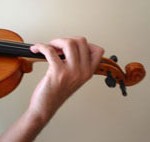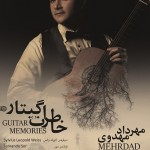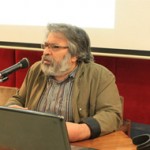I still think of those fish in a crystal bowl for the Haft sin table and those disappointed old men who went out to sell blackfish.
Tag Archives: Kamkars
Latest posts
- Transition to Enlightenment: Six Lectures on Mozart’s String Quartets (5)
- Nasser Masoudi: The Voice of Gilan and a Legacy of Iranian Music
- Farhad Poupel: The Voice of the Shahnameh in the Orchestras Around the World
- Five Major Myths About Mozart’s Life
- Bahma Rajabi Passed Away!
- Reza Vohdani; Unveiling unpublished works, preservation of Iranian classical music
- Ahmad Pejman Passed Away!
- Timeless or Timely: The Role of Historical Context in Defining Artistic Value
- Leading the Charge in Censorship
- The Legacy of Khosrow Jafarzadeh
- Transition to Enlightenment: Six Lectures on Mozart’s String Quartets (4)
- Fereydoun Shahbazian, An Iranian Musical Icon Passed Away
From Past Days…

Principles of Violin Playing (VIII)
1.5.1.3.sometimes, a player, due to different reasons, may decisively want to play continuously two notes with a half-step by means of the same finger, in such a case, it’s necessary to open the interior curve of the finger like a spring. Naturally coming back, the curve of finger should be closed and the finger should become curved shape again (see paragraph 3.1.2.1).

“Guitar Memories” Released
The album “Guitar Memories” consists of the performance of baroque to recent era masterpieces, by Mehrdad Mahdavi, and is published by Tanin-e Honar Publication.
In this album there are pieces composed and arranged by artists such as: Sylvius Leopold Weiss, Johann Anton Logy, Fernando Sor, Yuquijiro Yocoh, Leo Brouwer.

Call for papers SIMF 1396
The Association of Iranian Contemporary Music Composers (ACIMC) and SHAHREAFTAB Art & Cultural Association are pleased to announce a call for papers for SIMF 1396.

Ennio Morricone’s music for Quentin Tarantino’s The Hateful Eight
After watching Quentin Tarantino’s latest movie, The Hateful Eight, everyone was excited by its novel music besides the beautiful scenes of blood and guts.
The Hateful Eight is the first collaboration between the world-famous film music composer, Ennio Morricone, and Quentin Tarantino as a famous director.

Music education in third-world countries
Music education in third-world countries is facing many problems that limit access to it and it’s full of challenges. These rising and falling obstacles are made of the socioeconomic, cultural educational systems, etc.

Principles of Violin Playing (IX)
4.3.1. To practice playing of doubles of notes involving two different fingers, each note is played at separate bows with slow tempo, each note is played perfectly regarding its bass and tenor sounds and then the considered double is played at another bow while considering the resulted sound of the double.

The Structure of Kurdistan Daf (I)
Today, percussion instruments have such a high place in music that are an essential element of orchestras. This has attracted many people to this type of instrument with roots as old as the first humans. A historical study of music, shows that humans used the sound of these instruments to defend themselves against wild animals and, over time, for alerting each other, signaling their readiness and encouraging people for war, ritual ceremonies, dances, etc. in a manner that is still clearly visible in music and some ritual ceremonies.

A year without Mohsen Ghanebasiri
The year 1396 (21 March 2017-20 March 2018) was the most sorrowful year for HarmonyTalk journal. One month after holding HarmonyTalk’s 13th establishment anniversary in Mohsen Ghanebasiri’s house in Tehran in April 2017, he untimely passed away. Mohsen Ghanebasiri was the prominent HarmonyTalk author.

A Note on the Occasion of Houshang Zarif’s Demise
No introduction is needed when talking about the position of the late Houshang Zarif (1938-2020) in the Iranian music. His character and personality are so well-known among musicians that his name per se is a symbol and role model for the Iranian youth. “Becoming Houshang Zarif” is the dream of many young people who enter the world of music in Iran and many of whom retire regretting the realisation of this dream.

The Structure of Kurdistan Daf (VII)
Conclusion
“Daf” is one of type of percussion instruments that has a long history and is commonly known as circular instruments (with a rim). In some tribes, Daf was used as the main instrument in festivity and joy ceremonies; in another tribe it was used as the main instrument for war and campaign ceremonies and some others used it for ritual and religious ceremonies.